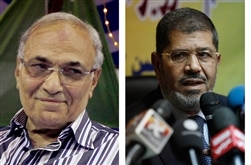Egypt delayed the results of the presidential runoff which took place last weekend, with the former president was still in coma after a stroke he suffered two days earlier.
Egypt delayed the results of the presidential runoff which took place last weekend, with the former president was still in coma after a stroke he suffered two days earlier.
"Egypt's election commission, headed by Judge Faruq Sultan... has decided to delay the announcement of the presidential election run-off," the official MENA news agency said late on Wednesday.
The election commission did not say when it would announce the winner of the runoff which took place on June 16 and 17 between the Muslim Brotherhood's candidate, Mohammed Mursi, and Mubarak's former prime minister, Ahmad Shafiq.
Both candidates claimed they won, and the commission was supposed to declare the top vote-getter on Thursday.
But its secretary-general, Hatem Begato, told the state newspaper Al-Ahram that the winner would be announced on Saturday or Sunday.
The election commission said it was looking into appeals from lawyers of both candidates into alleged campaign violations and disputed vote counting.
The commission would "continue examining the appeals... which will require more time before the final results are announced," it said.
MUBARAK IN COMA
Adding to the confusion and uncertainty on Wednesday were conflicting reports about the health of Hosni Mubarak, who is serving a life sentence for role in killing protesters during the uprising that ousted him last year.
At one point on Tuesday, he was said to be near death, while some believed the report was a pretext by sympathetic allies of Mubarak to transfer him out of prison to a more comfortable facility.
Egypt's state television carried a ticker item saying Mubarak was in "a coma and is not clinically dead."
State news agency MENA had earlier said the ousted strongman, 84, had been declared clinically dead after suffering a stroke in prison and being transferred to hospital.
POLITICAL CHAOS
Reports on Mubrak’s health come amid a backdrop of legal and political chaos, especially after the military council dissolved the People Assembly.
The Brotherhood appeared set on a confrontation path with the ruling Supreme Council of the Armed Forces (SCAF) which issued a new constitutional declaration granting itself sweeping powers.
